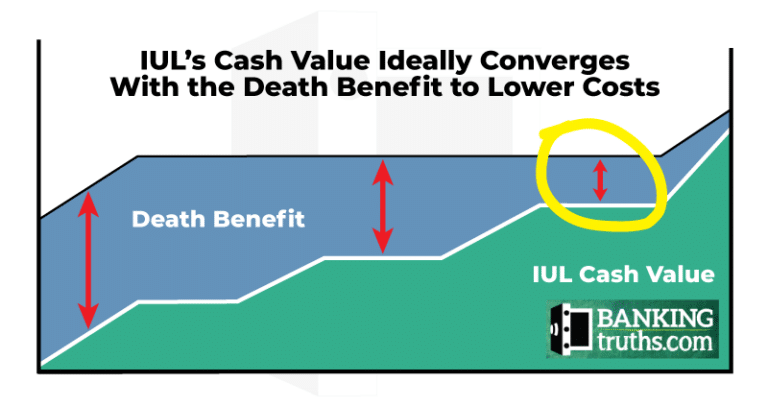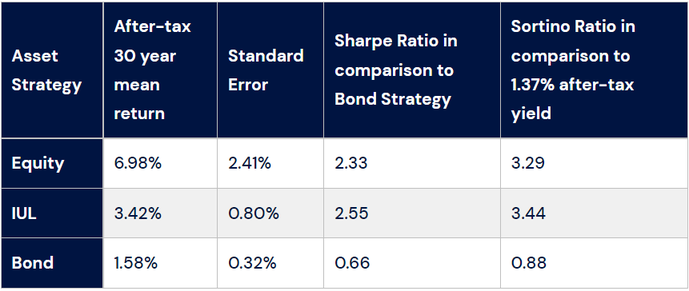All Categories
Featured
Table of Contents
Do they contrast the IUL to something like the Vanguard Overall Stock Market Fund Admiral Shares with no load, an expenditure proportion (ER) of 5 basis points, a turn over proportion of 4.3%, and an outstanding tax-efficient record of circulations? No, they contrast it to some terrible actively handled fund with an 8% load, a 2% ER, an 80% turn over proportion, and a terrible record of temporary resources gain circulations.
Mutual funds frequently make annual taxable circulations to fund proprietors, even when the value of their fund has actually decreased in value. Shared funds not only call for revenue reporting (and the resulting yearly taxation) when the common fund is going up in worth, yet can likewise impose income taxes in a year when the fund has actually dropped in value.
You can tax-manage the fund, collecting losses and gains in order to decrease taxed circulations to the investors, however that isn't somehow going to alter the reported return of the fund. The ownership of shared funds might require the common fund owner to pay approximated taxes (iul reviews).

IULs are simple to position to make sure that, at the owner's fatality, the recipient is exempt to either revenue or estate tax obligations. The same tax obligation decrease methods do not work nearly too with mutual funds. There are many, frequently expensive, tax obligation traps linked with the timed purchasing and marketing of shared fund shares, catches that do not put on indexed life Insurance.
Opportunities aren't very high that you're going to undergo the AMT because of your common fund distributions if you aren't without them. The rest of this one is half-truths at ideal. While it is real that there is no revenue tax due to your heirs when they inherit the profits of your IUL policy, it is likewise real that there is no income tax obligation due to your heirs when they inherit a shared fund in a taxable account from you.
Indexed Universal Life Insurance Vs Term
The federal estate tax obligation exemption limit is over $10 Million for a couple, and expanding each year with inflation. It's a non-issue for the vast majority of physicians, much less the rest of America. There are better means to avoid estate tax obligation concerns than buying investments with reduced returns. Mutual funds may cause income taxes of Social Protection benefits.

The development within the IUL is tax-deferred and may be taken as tax obligation totally free revenue using car loans. The plan proprietor (vs. the shared fund manager) is in control of his/her reportable revenue, thus enabling them to reduce and even eliminate the taxation of their Social Safety and security benefits. This set is fantastic.
Right here's one more marginal concern. It holds true if you purchase a common fund for state $10 per share prior to the distribution date, and it disperses a $0.50 distribution, you are after that going to owe taxes (most likely 7-10 cents per share) despite the truth that you have not yet had any gains.
In the end, it's truly regarding the after-tax return, not just how much you pay in taxes. You are going to pay even more in tax obligations by utilizing a taxable account than if you get life insurance policy. You're also probably going to have even more money after paying those tax obligations. The record-keeping requirements for owning shared funds are significantly a lot more complex.
With an IUL, one's documents are kept by the insurance policy company, copies of annual declarations are sent by mail to the proprietor, and distributions (if any type of) are totaled and reported at year end. This is also sort of silly. Naturally you need to maintain your tax records in case of an audit.
Who Should Buy Universal Life Insurance
All you need to do is shove the paper right into your tax obligation folder when it reveals up in the mail. Hardly a reason to buy life insurance policy. It resembles this person has actually never spent in a taxed account or something. Common funds are typically component of a decedent's probated estate.
On top of that, they go through the delays and expenditures of probate. The earnings of the IUL plan, on the other hand, is always a non-probate distribution that passes beyond probate straight to one's called recipients, and is for that reason exempt to one's posthumous creditors, unwanted public disclosure, or similar delays and costs.
We covered this under # 7, but just to evaluate, if you have a taxable mutual fund account, you must put it in a revocable depend on (or also easier, use the Transfer on Death designation) to avoid probate. Medicaid incompetency and lifetime income. An IUL can give their owners with a stream of revenue for their entire lifetime, no matter of just how lengthy they live.

This is advantageous when arranging one's events, and converting possessions to revenue prior to a nursing home arrest. Common funds can not be converted in a comparable way, and are almost always considered countable Medicaid possessions. This is an additional dumb one promoting that bad individuals (you understand, the ones who need Medicaid, a government program for the poor, to pay for their nursing home) should make use of IUL rather of common funds.
Universal Life Policy Vs Term
And life insurance looks dreadful when contrasted rather against a pension. Second, individuals that have money to acquire IUL over and beyond their pension are mosting likely to have to be awful at handling money in order to ever qualify for Medicaid to pay for their assisted living home prices.
Persistent and incurable illness rider. All policies will allow a proprietor's simple access to money from their plan, often waiving any kind of abandonment fines when such people endure a serious illness, require at-home care, or become confined to a nursing home. Common funds do not supply a similar waiver when contingent deferred sales fees still use to a mutual fund account whose owner requires to market some shares to money the costs of such a remain.
Iul Marketing
You get to pay even more for that benefit (motorcyclist) with an insurance policy. Indexed global life insurance coverage offers fatality benefits to the beneficiaries of the IUL proprietors, and neither the owner neither the recipient can ever before shed money due to a down market.
I definitely don't require one after I reach economic freedom. Do I want one? On average, a buyer of life insurance policy pays for the true expense of the life insurance coverage benefit, plus the prices of the plan, plus the profits of the insurance business.
Gul Policy
I'm not completely certain why Mr. Morais tossed in the entire "you can't lose money" once again here as it was covered rather well in # 1. He simply wanted to repeat the finest marketing factor for these things I expect. Again, you don't shed small bucks, however you can lose genuine bucks, in addition to face severe possibility price due to reduced returns.

An indexed global life insurance policy plan owner may exchange their plan for a totally different plan without causing revenue tax obligations. A mutual fund proprietor can stagnate funds from one common fund firm to another without marketing his shares at the previous (hence setting off a taxed occasion), and repurchasing brand-new shares at the last, frequently subject to sales costs at both.
While it holds true that you can exchange one insurance plan for another, the factor that individuals do this is that the very first one is such an awful plan that even after acquiring a new one and experiencing the very early, unfavorable return years, you'll still come out ahead. If they were sold the best policy the very first time, they should not have any desire to ever trade it and experience the very early, adverse return years once again.
Table of Contents
Latest Posts
Net Payment Cost Index Life Insurance
Iul Investment Calculator
National Life Iul
More
Latest Posts
Net Payment Cost Index Life Insurance
Iul Investment Calculator
National Life Iul